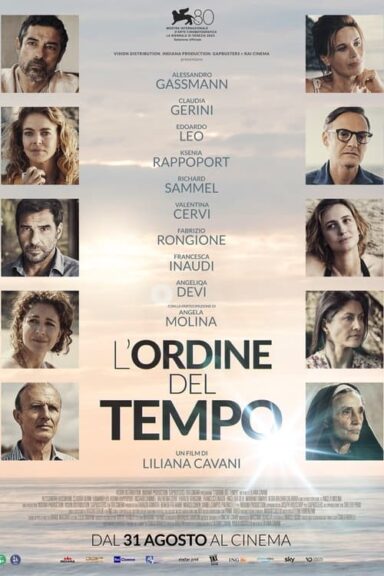
A film by Liliana Cavani
With: Alessandro Gassmann, Claudia Gerini, Edoardo Leo, Kseniya Rappoport, Richard Sammel, Valentina Cervi, Francesca Inaudi, Angeliqa Devi, Mariana Tamayo, Fabrizio Rongione
It explores what happens to a group of long-term friends one night when, during their annual get-together to celebrate a birthday in a villa by the sea, they discover that the world might be ending within the space of a few hours. From that moment on, the time separating them from the possible end of their lives seems to flow differently, both speedily and never-endingly, over a summer’s night which will change their lives forever.
Our rate: *(*)
While the 80th Venice Biennale has chosen to honor (right now, following the opening ceremony) Liliana Cavani, her latest film is being screened out of competition. The iconic director of Portier de Nuit returns with a story that was probably inspired by the Covid epidemic, and the feeling that this threat may have awakened in everyone, the awareness of a potentially near end, of an uncertain remaining life that calls for putting one’s cards on the table, communicating better with loved ones, bringing to light hidden truths and escaping established lies. By proposing a bourgeois huis-clos set against the backdrop of the end of the world – the protagonists’ relative confinement in a resort residence overlooking a rather paridisiac beach – Cavani ventures into territory that has already inspired the likes of Lars Von Trier (the masterpiece Melancholia) and Abel Ferrara (the much more debatable 4:44 Last Day on Earth). Formally, the film is a major disappointment, with a series of very short field-versus-field shots that follow the words of the various characters gathered to celebrate the 50th birthday of Raphaella and her husband, the owners of the residence, as they move from the house to the beach, and for the guests, as they drive to the place where they revisit their pasts in collective confidence. We were hoping for more audacity, more breath of fresh air, which Pietro Marcello’s beautiful music, used without any finesse, doesn’t bring. The viewer finds himself locked inside with these characters, about whom little is known except that they all hold respectable positions in society (legitimate Nobel Prize nominee, top scientist, professor for those whose profession is revealed). Among them, however, is a Peruvian maid, reminiscent of a bygone era. Each character, and each couple, is confronted with their own sentimental preoccupations when one of them confesses to having worked on the trajectory of a comet named Anaconda, which is approaching the earth at a very high speed, threatening the extinction of humanity and the earth’s fauna. The feeling of panic doesn’t overwhelm them so much as curiosity about the technical elements of the phenomenon (how will it happen, can it be verified and predicted more accurately, will the stock market collapse to corroborate the announced thesis? Each of them is then worried not so much about dying, but about having to go on living without having resolved the torments that preoccupy them (unconfessed first love, unconfessed extramarital relationships, unlove, …) . A little drama ensues until that fateful moment when a time warp may occur… The whole thing doesn’t take much more than that, but let’s save a few bits of dialogue here and there for their essentially psychoanalytical purpose.

